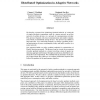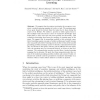66 search results - page 4 / 14 » Communication as a Means to Differentiate Objects, Component... |
73
Voted
AAI
2000
14 years 11 months ago
2000
Vivid agents [48] are software-controlled systems whose state comprises the mental components of knowledge, perceptions, tasks, and intentions, and whose behaviour is represented ...
83
Voted
NIPS
2003
15 years 1 months ago
2003
We develop a protocol for optimizing dynamic behavior of a network of simple electronic components, such as a sensor network, an ad hoc network of mobile devices, or a network of ...
94
Voted
SMC
2010
IEEE
14 years 10 months ago
2010
IEEE
Abstract— Wireless networked control systems have begun to gain acceptance during the last decade, largely due to the increased flexibility and lower costs they promise to provi...
WCE
2007
15 years 24 days ago
2007
— The advent of ubiquitous computing has revolutionized distributed Multi-agent systems (MAS). Consequently, there are many software projects focusing on MASs. However, its succe...
104
click to vote
EELC
2006
15 years 3 months ago
2006
Abstract. We suggest that the primary motivation for an agent to construct a symbol-meaning mapping is to solve a task. The meaning space of an agent should be derived from the tas...


